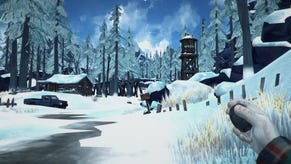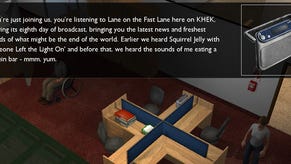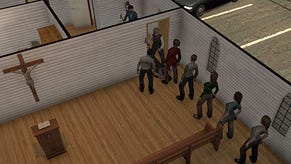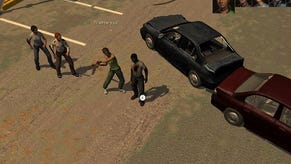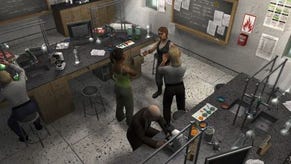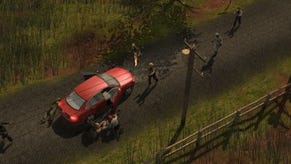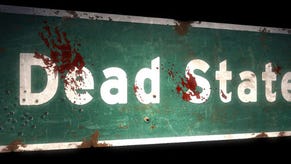Dead On: A Dead State Interview
"Balancing dramatic conversations with moments of levity"
Since we first glimpsed Dead State back in 2010, it has gone through a successful Kickstarter and is now well on the way down the road to completion. We talked to project lead Brian Mitsoda about the important of writing, the value of Kickstarter, and pinball.
RPS: Hey, Brian! It's been a while since we talked. How are things going with Dead State?
Mitsoda: Well as always it's a lot of people working on a lot of different things! As far as the project goes we're breaking it into three categories: one is the dialogue and writing, which is something I have been doing a lot of work on in the past few months. That's coming along really well now. Then there's the combat portion, which is what we're showing off now. It's obviously not 100% done, but the basics are there and it's pretty much everything we promised. It's got the exploration of Fallout, it's got the turn-based combat of XCOM, and it's feeling pretty nice right now. There's a long way to go, of course, with stuff like getting the AI up to spec, getting every single thing in to every single area of the game, but there's progress there: we have pieces of our sets built, everything is very modular, so we can just drop down sets of sidewalks or shops. We've going to do a bunch of tweaks to combat based on the feedback we've had from the team. So that's progressing well.
Then finally, the third thing, it's a case of working on the shelter, which is the element which pulls it all together. You've got the management there, you've got a lot of the scripting in there, day by day triggering conversations, all the allies stuff, launching stuff to the area map. We will be facing that as the next challenge: bringing the combat and dialogue sections together.
RPS: You can almost imagine Dead State as a pure survival game, outside of a dialogue-driven RPG context, so what's the importance of writing to the game? What sort of challenge does it present to make the writing actually matter?
Mitsoda: Well, it's challenging. It's the most challenging game I have worked on in terms of writing. You can't tell who is going to be dead, or what they're going to have. You can't tell which allies they're going to have, and so on. You have to have dialogue that supports that. We need a character there to present stuff and help you along, and to have dialogue which supports that no matter the situation. There's the bigger picture of the story, which is “okay, here's your daily survival stuff” and you tie that in with your morale system, and then you have to judge how characters moods react to that – the food and luxury items they've had, for example.
We could have set the game up to have very limited dialogue and still had it be challenging and compelling, but one of the things I wanted to do was to give people real character, to give them believable human personalities, so that they have their flaws, have their moments where you are like “oh okay, that guy isn't such a bad person,” or maybe “no, they really are an asshole!”
It's one of those things where there's a big balancing act, where you have those big enemy factions you are going to go up against on the one hand, and then you have much smaller things which will take up your time, like this character and that character who are squabbling, and you want to diffuse that without pissing either side off. It's about being a leader, about being a person who is thrown together with people you don't know but you need to depend on. That's key for the dialogue I have been writing, so there's a lot of reactivity, a lot of personal interaction with the characters, and that's the stuff that is critical. Far more than setting up big enemy factions or epic drama, it's about struggling to get by with your own crew. That's why it's important to the game.
RPS: I noticed in a mail from you a while back your sig referenced Bloodlines, which you worked on as a writer. Is there stuff there that you saw worked and now appears in Dead State?
Mitsoda: As far as Bloodlines go, well... Balancing dramatic conversations with moments of levity. In Bloodlines what we want to get away from was the vamp thing being all gothy and conflicted, and we had some of that, but you also had to have moments of life and comedy. If Dead State were constant depressing conversations about the apocalypse, or constant bickering, it would be a chore! You'd be like “I hate these people!” Having lots of different characters that fill lots of different roles deals with that. One person will have a secret, there's something intriguing about them and you don't know what that is, another will be reliable but in some way tied to another character, where they have loyalties to that character too. You bring in a lot of stuff.
Some characters do provide a sense of relief, people do have a sense of humour in the face of life or death horror, and that provides balance. It's important to get the player to like our characters. It's one of those things that I think is really important. One of the things in games or shows that are apocalyptic or post-apocalyptic, is that everyone will constantly be dealing with these horrible problems, and I guess I can call out Walking Dead at this point, but whenever I watch this I am like “oh, man, these people are awful. I can't relate to them at all.”
RPS: Yeah, I think that's one of the great lessons of writing, isn't it? Having a sense of humour about something doesn't mean you aren't taking something seriously. And vice versa: it's possible to be very serious about humour. I think the best writers understand that. Without that fiction doesn't feel human.
Mitsoda: Yeah, it's like so often enemies are the interesting characters. Partly that because they do terrible things and are free to do so, but because they generally have a broad range from dealing with things on a personal level to dealing with things on an I AM TAKING OVER THE WORLD sort of level. I think another pitfall is that you can take a good joke too far, and sacrifice a character for a good joke, and that doesn't stay true to the character. You have to be careful.

RPS: So let's talk a bit more about combat, which is what you're now showing off. What's going in there?
Mitsoda: We're showing off one of the first areas in the game. I hesitate to call it a tutorial, but that's sort of what it is. It's one of the places you go to in your first day in the game. It's the town of Leno, which is very close to Splendid. We have that bit of the town and we're showing off the player character going through the town, and demonstrating how combat works. The game allows you to explore in real-time, and then if you get into combat it becomes turn-based. We have line of sight, so you don't see your enemies unless you or enemies have direct line of sight. We think that plays up the horror aspect of the game – because you're out there exploring and suddenly something jumps out at you.
We're showing off melee and ranged combat, and also noise: your weapons and actions make noise, so if you make a tonne of noise with a gun you will attract zombies or looters to your position. If you make enough noise you actually spawn zombies to the map. Of course there's the inventory in there, the combat GUI, the combat and zombie AI. It's not 100%, of course, but the looters and zombies will find you, no one is getting stuck on walls or anything like that!
Then there's also some lock picking and bashing down doors and so on in there. You can see our various combat animations, and of course the map itself. Some of that stuff is temp, of course, but I have outlined a bit of what will change in the future. Overall this is a really large update as to where we are on the project. We generally don't do probably as much publicity as a lot of other companies, but that's partly because it falls to me, and I am stuck with ten tasks at once, so we wanted to do a major update and get everyone excited about the game again.
RPS: This has been a long haul for you, hasn't it? Didn't you start around 2010?
Mitsoda: We started the very basics in 2010, but we did not start picking up momentum until we were getting ready for the Kickstarter. After that we were, of course, able to get people in working on the game full time, so the major progress has been since the Kickstarter ended (in summer of 2012). Now we're getting daily builds and there's just a lot of progress. Everyone's contributing new stuff all the time. All of these various pieces are now going in, and it's awesome to see. Even though we technically started in 2010, we didn't hit full production until we were able to fund it. It's an RPG too, and even with a team of ten people this is a massive beast to make. It's still a very large game to create, because there is so much to go in, but we've been making a lot of progress.
RPS: What did that Kickstarter money mean?
Mitsoda: Well before the Kickstarter people were just volunteering time on it. After it we were able to give everyone some money. We're not making huge amounts, but we were able to bring on people like artists and fund them. We were able to buy equipment and licences, so it made a world of difference. It's a tight budget compared to some other RPG projects out there, we don't have millions of dollars, so it's a balancing act, but we knew exactly what we were getting in to. We knew what was needed, when we need to bring people in, and so on. That's all going according to plan, which is great.
The team is me, my lead artist Oscar, my lead programmer Nick, our animator Ivan. Then there's the additional programmer, Eugene, and several other artists for environmental, GUI, prop, and 2D stuff. We have a new producer, and we're probably going to bring in a couple of other people at some point. And of course my wife Annie has been contributing to the project. She's a big reason the design was in the state it was when we started it. Most of the people in this project has been working on this since they were working on it in their free time. They've stayed on the game, and that's great.

RPS: Have you been following events on Kickstarter?
Mitsoda: We do keep an eye on it, of course. We've actually backed a couple of pinball projects. I love classic pinball table stuff.
RPS: Interesting! Would you be designing pinball games in another life?
Mitsoda: Haha, no, no! I actually know nothing at all about making a pinball table, but I do like playing classic pinball, a lot. I love the score challenging aspect of that stuff, and it's extremely relaxing for me. Like golf. Except I hate golf.
RPS: Thanks for your time.
Dead State should arrive in December 2013.



